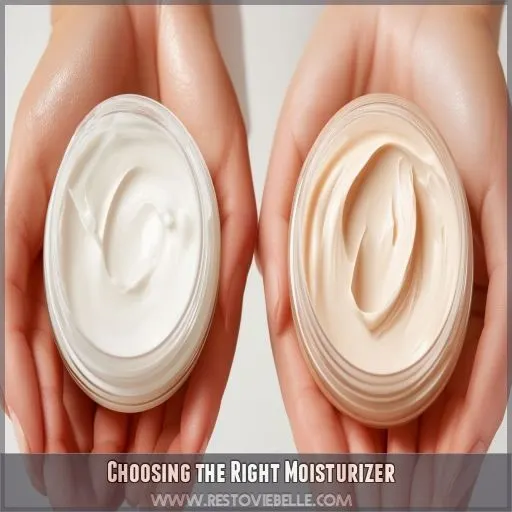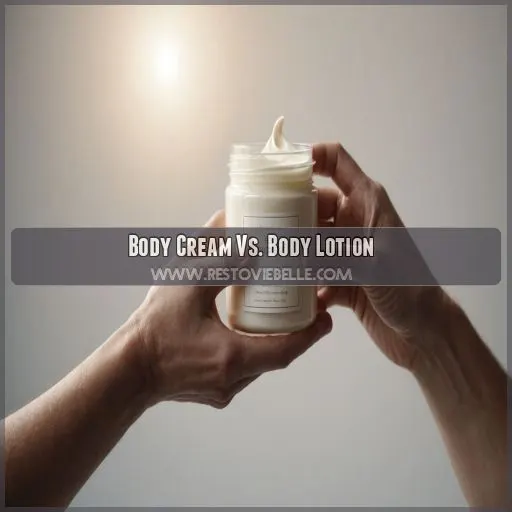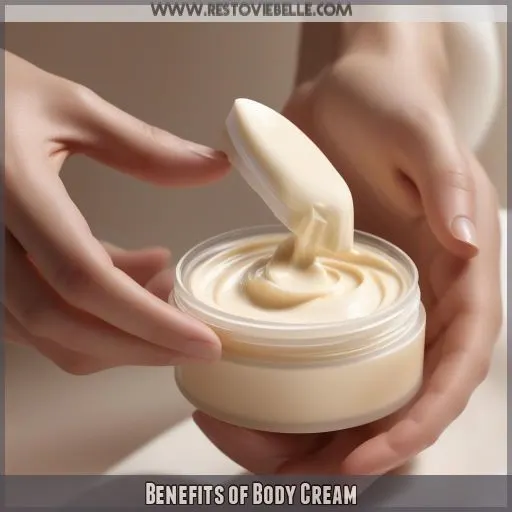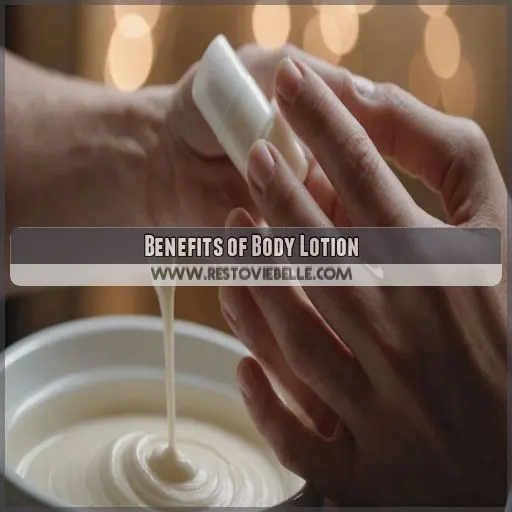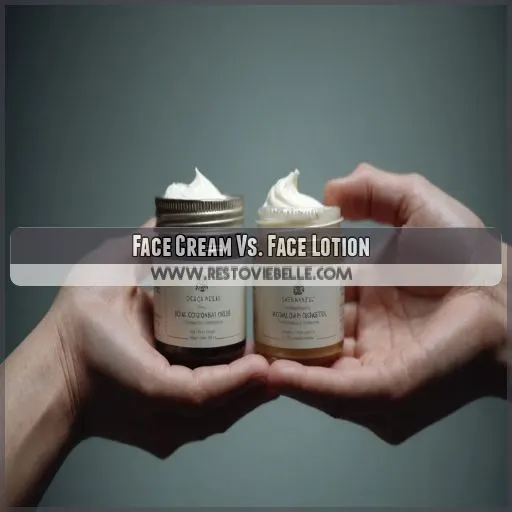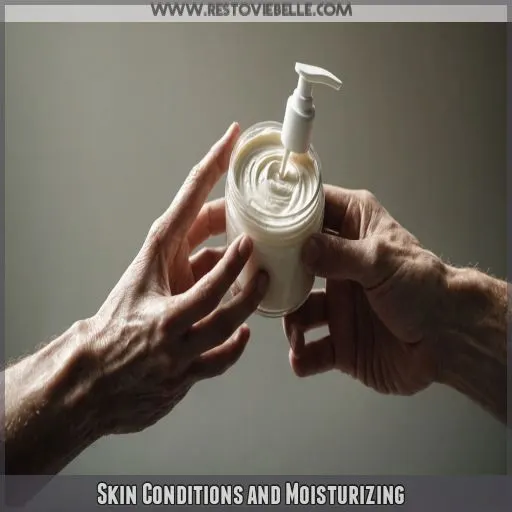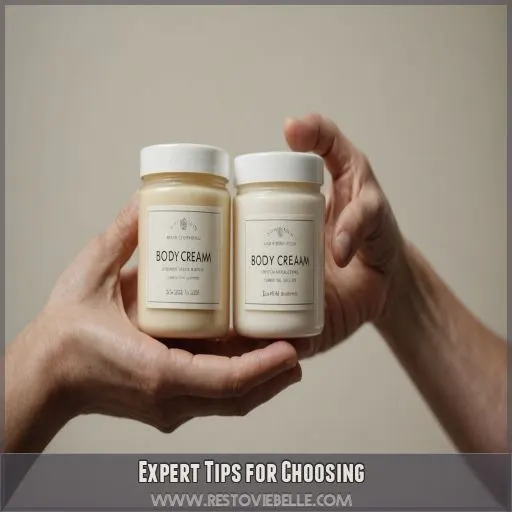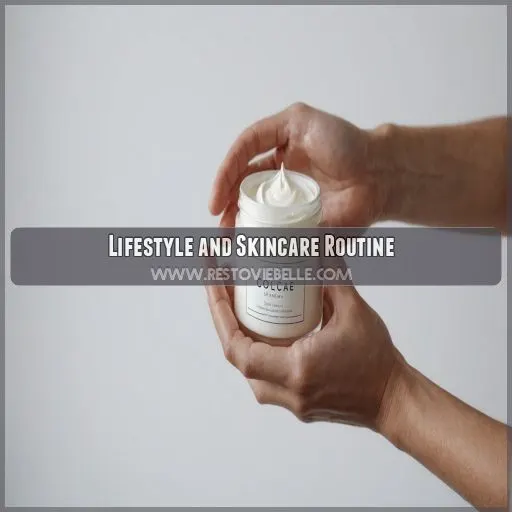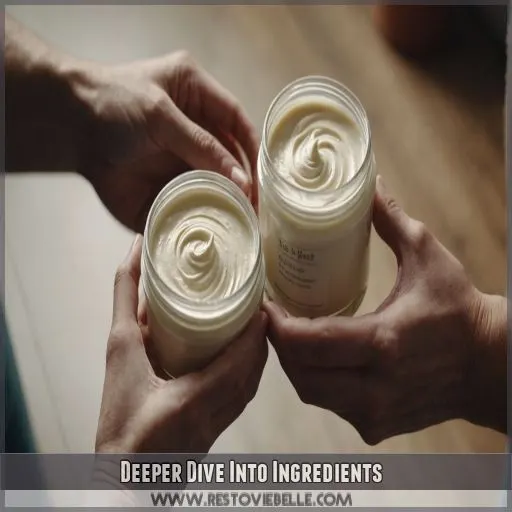This site is supported by our readers. We may earn a commission, at no cost to you, if you purchase through links.
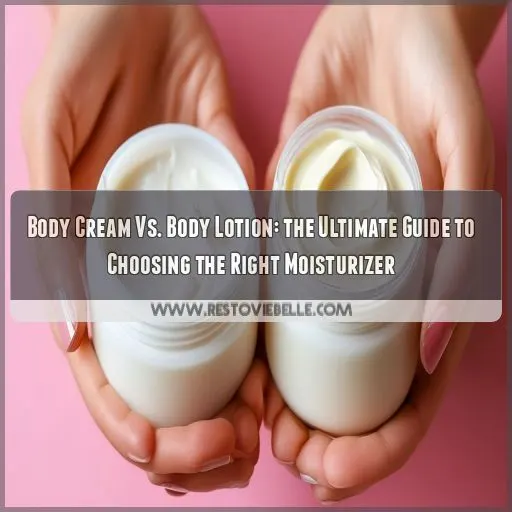
Body creams are thicker and richer, perfect for locking in moisture and nourishing dry skin. They’re like a tall glass of water for your skin, quenching its thirst. On the other hand, body lotions are lighter and more breathable. They’re like a quick drink of hydration, perfect for when you want something fast and easy.
Table Of Contents
- Key Takeaways
- Choosing the Right Moisturizer
- Body Cream Vs. Body Lotion
- Benefits of Body Cream
- Benefits of Body Lotion
- Face Cream Vs. Face Lotion
- Skin Conditions and Moisturizing
- Expert Tips for Choosing
- Common Misconceptions
- Lifestyle and Skincare Routine
- Deeper Dive Into Ingredients
- Frequently Asked Questions (FAQs)
- Which is better body cream or body lotion?
- Can I use body cream instead of lotion?
- When should you use body cream?
- Is body cream just lotion?
- How often should I apply body cream or lotion?
- What ingredients should I avoid in body creams and lotions?
- Can I use body cream or lotion on my face?
- Are body creams and lotions safe for sensitive skin?
- How do I know if my skin is dry, oily, or combination?
- Conclusion
Key Takeaways
- Body creams are like a cozy blanket for your skin, perfect for dry types craving intense hydration. They’re the heavyweight champs of moisture, locking it in like Fort Knox.
- Lotions are the cool, refreshing drink your skin needs on a hot day. Light and breezy, they’re ideal for oily or combo skin types that want hydration without the heavy feeling.
- Your skin type is as unique as your fingerprint, so don’t be afraid to play matchmaker. Mix and match creams and lotions depending on the season, your mood, or your skin’s current tantrum.
- Remember, moisturizing isn’t just skin-deep – it’s part of a healthy lifestyle. Pair your cream or lotion with a balanced diet, plenty of H2O, and some beauty sleep for that glow-from-within look.
Choosing the Right Moisturizer
Choosing the right moisturizer is a bit of a science and an art. It involves understanding your skin type and its unique needs, and then matching those needs with the right product.
Understanding Skin Types
Your skin is unique, and understanding its type is key to choosing the right moisturizer. There are a few common skin types, and knowing which one you have will help you decide whether to go for a body cream or a body lotion.
But first, let’s clear something up: skin types can change. It’s not set in stone. Your skin might be dry one day and oily the next.
Dry Skin Vs. Oily Skin
Choosing between a body cream and a body lotion depends on your skin type. If you have dry skin, creams are your best bet. They’re thicker and richer, providing that extra hydration boost your skin needs. Think of it like feeding your skin a hearty meal—creams are like a comforting stew, while lotions are more of a light snack.
On the other hand, if your skin tends to be on the oilier side, you’ll want to reach for a lotion. Lotions are like a glass of water for your skin. They provide hydration without leaving a greasy residue, so you won’t feel like you’re drowning your skin in excess moisture.
Combination Skin
If you have combination skin, you know the struggle of managing both dry and oily areas. Here’s a guide to choosing the right moisturizer:
- Oily T-Zone: For your T-zone (forehead, nose, and chin), opt for a non-comedogenic lotion to avoid clogging pores.
- Dry Cheeks: To nourish your cheeks, choose a cream with hydrating ingredients like hyaluronic acid or shea butter.
- Best Products: Lotions are ideal for oilier areas, while creams provide extra hydration for dry spots.
- Daily Routine: Incorporate light exfoliation to help moisturizers penetrate the skin effectively.
- Moisturizer Tips: Experiment with different formulas to find what works best for your unique skin.
Sensitive Skin
If you have sensitive skin, you know the struggle of finding products that won’t irritate your skin. Here’s a helpful guide to choosing the right moisturizer:
| Type of Product | Sensitive Skin |
|---|---|
| Body Cream | ✔️ |
| Body Lotion | ❌ |
| Body Butter | ❌ |
| Face Cream | ✔️ |
| Face Lotion | ❌ |
Opt for body creams and face creams with fragrance-free formulas to avoid potential irritant reactions. Creams that focus on barrier repair can help strengthen your skin barrier function, creating a protective shield against external irritants.
Body Cream Vs. Body Lotion
Whether you’re dealing with dry winter skin or just looking for a daily moisturizer, the debate between body cream and body lotion can be confusing. Let’s break down the differences so you can choose the right option for your skin’s needs.
Texture and Consistency
Now, let’s get our hands dirty and explore the nitty-gritty of body creams and lotions. We’re talking texture and consistency—the creamy touch and smooth spread that makes all the difference.
Think of body creams as your thick, rich, and creamy companions. They’ve got a real dense texture, like that extra-chunky soup you love. Lotions, on the other hand, are the thin, light, and free-flowing gang. They’re more like a cool glass of juice on a hot day.
With their thicker consistency, body creams take their sweet time to absorb into your skin. They’re like the tortoise in the famous race, slow and steady. Lotions, being the hare, are quick to soak in and leave your skin feeling soft and smooth.
Here’s the deal: body creams give your skin a luxurious, intensely moisturized feel. They’re like wrapping yourself in a cozy blanket. Lotions, being lighter, provide a subtle hint of moisture, like a gentle summer breeze on your skin.
Ingredients and Formulation
Body creams and lotions differ in their ingredients and formulation, which is key when choosing the right product for your skin. Here are the key differences:
- Oil Content: Body creams typically contain heavier oils like shea butter and coconut oil, providing a richer, more occlusive formula. Lotions, on the other hand, usually have a higher water content and are formulated with lighter oils such as jojoba or almond oil.
- Emollients: The higher oil content in body creams makes them effective emollients, creating a protective barrier on the skin to lock in moisture. Lotions, with their lighter formulation, absorb quickly and provide a more breathable feel.
- Natural Ingredients: Both body creams and lotions can be formulated with natural ingredients like hyaluronic acid, panthenol, and allantoin, offering additional skincare benefits. Remember, natural ingredients can also cause skin sensitivities, so patch testing is always recommended.
When to Use Each
So, when should you use each? Well, it depends on a few factors, like the season, time of day, and your skin type.
Here’s a handy table to help you decide:
| Season | Time of Day | Skin Type | Product |
|---|---|---|---|
| Winter | Nighttime | Dry | Body Cream |
| Summer | Daytime | Oily | Body Lotion |
In the colder months, a body cream will provide a protective barrier against dry air, locking in much-needed moisture. At night, your skin is more permeable, so a thicker cream can penetrate deeper and work its magic while you sleep.
On the other hand, during the warmer, more humid months, a lightweight body lotion is ideal. It’ll give you the hydration you need without feeling greasy or heavy. Lotions are perfect for daytime use as they absorb quickly, leaving your skin ready for the day ahead.
If you have dry skin, a body cream will be your best friend all year round. But if your skin is on the oilier side, stick with a lotion to keep your skin happy and healthy.
Benefits of Body Cream
Body creams offer a range of advantages, especially for those with dry or sensitive skin. With their thicker consistency, body creams provide an effective barrier that helps lock in moisture, keeping your skin hydrated and nourished.
Locking in Moisture
Body creams are particularly beneficial if you have dry skin. Their thicker, richer texture helps lock in moisture, creating a protective barrier on your skin. This is especially useful during colder months when the air tends to be drier. By using a body cream, you can prevent moisture loss and keep your skin hydrated for longer.
Nourishing Dry Skin
If you’re dealing with dry skin, body creams are your best bet.
Their thicker consistency and higher oil content make them ideal for locking in moisture and providing extra nourishment.
Creams are especially beneficial if you live in a cold, dry climate or experience very dry skin.
The rich formulas of body creams create a protective barrier, shielding your skin from the elements and helping it retain much-needed hydration.
Protecting Sensitive Skin
- Gentle cleansers: Opt for gentle, hydrating cleansers that won’t strip your skin. Avoid harsh soaps and choose fragrance-free options to minimize irritation.
- Irritant avoidance: Identify and avoid common irritants like fragrances, dyes, and certain preservatives. Choose products with soothing ingredients like aloe vera or chamomile instead.
- Barrier repair: Strengthen your skin’s natural barrier with rich, emollient body creams. The thicker formula helps repair damage and protects against environmental triggers.
- Sunscreen choice: Don’t forget SPF! Sun damage can aggravate sensitive skin. Choose a body cream with SPF or apply sunscreen daily to protect your skin.
- Ingredient check: Be a label detective. Choose creams with calming, anti-inflammatory ingredients like oatmeal, green tea, or niacinamide. Avoid known irritants and always patch test new products.
Nighttime Application
Nighttime application is where body creams really shine.
While you sleep, your skin becomes more permeable, allowing the rich ingredients in body creams to penetrate deeper and work their magic.
This makes it the perfect time to slather on some cream and wake up to softer, more supple skin.
So, if you’re looking for an intensive moisture boost, swap out your lotion for a cream before bed.
Your skin will thank you in the morning!
Benefits of Body Lotion
Body lotion is your go-to for lightweight hydration that won’t weigh your skin down. It’s perfect for when you want to keep your skin moisturized without that heavy, greasy feeling.
Lightweight Hydration
Body lotions are your best bet for a quick hydration fix without the weight. Their thinner, more watery consistency makes them ideal for a light feel, especially in hot weather. If you’re not a fan of thick creams, lotions are your lightweight buddy.
- Non-greasy hydration
- Quick absorption
- Less likely to clog pores
- Perfect for daytime and layering
Oil Control and Acne Prevention
If you’re dealing with acne-prone or oily skin, body lotions are your skin’s best friend. Their lighter texture and lower oil content make them ideal for preventing clogged pores, especially in areas like the chest, back, and shoulders.
| Skin Type | Product Choice | Benefits |
|---|---|---|
| Oily Skin | Lotions | Hydration without heaviness |
| Acne-Prone Skin | Lotions | Non-comedogenic, won’t clog pores |
| Combination Skin | Lotions | Light hydration, controls shine |
Daytime Use and Sun Protection
Body lotion is perfect for your daytime routine, especially if you’re looking for a quick-absorbing, non-greasy option. Here’s why:
- Sun Protection: Body lotions often contain SPF, offering protection against sun damage and lowering your risk of skin cancer.
- Lightweight Feel: Their lighter texture makes them ideal for layering under makeup or clothing without feeling heavy or sticky.
- Breathability: With a lower oil content, lotions are more breathable, preventing that unpleasant greasy feeling, especially in warmer months.
- Easy Application: Lotions are designed to spread easily, making them a convenient choice for covering larger areas of the body.
- Suitable for Oily Skin: If you have oily skin, lotions can help control shine and provide a matte finish, giving you a fresh, healthy glow.
Humid Weather and Summer Months
When the weather’s sticky and the sun’s blazing, you might wanna skip body cream. Why? Well, it’s like slathering on extra butter when you’re already feeling the heat.
Body lotion, on the other hand, is like a cool drink of water. It’s lightweight and breathable, so it won’t leave you feeling greasy or clogged up. Think of it as a quick hydration boost that absorbs in a flash, leaving your skin feeling cool and comfortable.
Face Cream Vs. Face Lotion
Choosing the right moisturizer for your face is a delicate task. Face creams and face lotions offer different benefits, so it’s important to understand the unique needs of your facial skin to make the right choice.
Delicate Skin and Sun Damage
Your face has thinner skin that’s more prone to sun damage. So, choosing the right face cream or lotion is key. Face creams are often formulated with SPF and anti-wrinkle ingredients to protect against sun damage and aging. Face lotions are lighter and absorb quickly, making them ideal for those who want hydration without a heavy feel.
SPF and Anti-Wrinkle Ingredients
Face creams often include SPF for sun protection and anti-wrinkle ingredients to keep your skin looking youthful. It’s like having your very own superhero fighting off the evil forces of aging and sun damage!
While face creams focus on creating a protective barrier, face lotions are all about balance. They’re like a team of negotiators, working to control oil production and reduce shine. So, if you’re looking to keep your skin’s oil levels in check, face lotions might be your best bet.
Thinner Consistency and Quick Absorption
Your face is pretty delicate, so you want to be careful about what you put on it. Face creams and face lotions are different in some key ways you should know about:
- Face creams often have a thinner consistency compared to body creams, making them ideal for the sensitive skin on your face.
- Face lotions are designed for quick hydration and absorption, so you don’t have to worry about that heavy, greasy feeling.
- Lotions are perfect for combination skin, providing light hydration without clogging pores.
- Face creams are formulated with SPF and anti-wrinkle ingredients to protect and nourish your skin.
- Face lotions are great for those who want to avoid heavy textures, offering a balancing act for facial skin.
Balancing Oil Production and Shine
If you’re struggling with oily skin and shine, it’s time to think about the benefits of face lotions. Face lotions are designed to provide lightweight hydration without clogging your pores, making them ideal for combination and acne-prone skin.
To help control oil production and reduce shine, opt for face lotions with specific ingredients. Here’s a table to guide your choices:
| Ingredient | Benefit |
|---|---|
| Mattifying Agents | Absorb excess oil, giving a matte finish |
| Green Tea | Anti-inflammatory, reduces sebum production |
| Salicylic Acid | Exfoliates, unclogs pores, controls oil |
| Niacinamide | Regulates oil, reduces shine, refines pores |
| Hyaluronic Acid | Hydrates without adding oil, improves skin texture |
Skin Conditions and Moisturizing
Whether you’re battling eczema or psoriasis, struggling with acne, or just trying to keep your dry skin hydrated, choosing the right moisturizer is key. Understanding how different skin conditions respond to body creams and lotions can help you make informed choices for healthy, glowing skin.
Eczema and Psoriasis
If you’re dealing with eczema or psoriasis, you might be wondering which is better: body cream or body lotion? Here’s the lowdown:
For eczema:
- Go for ointments or creams, which have a higher oil content to soothe dry skin.
- Lotions are usually not thick enough, so skip those.
- Look for ingredients like shea butter to lock in moisture.
For psoriasis:
- Moisturizers can boost the effects of treatment.
- Use lotions for your scalp and creams or ointments for your body.
Acne and Oily Skin
If you’re dealing with acne and oily skin, lotions are your best bet. Their lighter, more breathable texture won’t clog your pores, which is key for keeping acne at bay.
Go for noncomedogenic lotions that are specifically designed to not clog pores. You also want something oil-free to keep that shine in check.
Dry Skin and Dehydration
Dry skin and dehydration are different beasts. Dry skin is a skin type, often genetic, with less-efficient oil production. Dehydration is a skin condition where your skin lacks water, affecting all skin types.
So, how can you tell if your skin is dehydrated? Look for these signs:
- Dull, tight skin
- Fine lines
- Dark undereye circles
Sensitive Skin and Irritation
If you have sensitive skin, you know that choosing the wrong product can lead to irritation and discomfort. Here’s how to pick the right body creams and lotions:
- Opt for fragrance-free options: Scented products are a common source of skin irritation, so choosing fragrance-free alternatives can help prevent allergic reactions and irritant contact dermatitis.
- Patch test: When trying new products, perform a patch test on a small area of skin to check for any signs of redness or inflammation. This simple step can save you from a full-blown allergic reaction.
- Look for skin-soothing ingredients: Seek out ingredients known for their calming properties, such as licorice extract, which can help reduce redness and hyperpigmentation.
Expert Tips for Choosing
Choosing the right product for your skin can be tricky, especially with the huge range of options available. Here are some expert tips to help you figure out body creams and lotions and make an informed decision.
Comedogenic Vs. Non-Comedogenic
When choosing between body cream and body lotion, it’s important to think about whether a product is comedogenic or non-comedogenic.
This is especially important if you have acne-prone skin.
Comedogenic products contain pore-clogging ingredients, leading to breakouts.
Non-comedogenic products are formulated without these ingredients, making them ideal for preventing acne and blackheads.
While lotions are generally lighter, always check the ingredients list for non-comedogenic labels, especially if you’re prone to breakouts.
Fragranced Vs. Fragrance-Free
Scented products can trigger allergies and irritate sensitive skin. If you’re prone to allergies or have sensitive skin, opt for fragrance-free options. Natural scents derived from essential oils may be a better choice if you enjoy scented products but want to avoid synthetic fragrances.
Skin Sensitivity and Irritation
If you have sensitive skin, it’s important to be mindful of potential irritants. Here are some tips to help you choose the right products:
- Opt for fragrance-free options to minimise the risk of irritation.
- Choose skincare products with natural ingredients, as these are often gentler on the skin.
- Consider using a foaming cleanser, which is usually well-tolerated by sensitive skin.
- Look for products containing mandelic acid, a gentle exfoliant that helps improve skin texture and tone.
- Try a triple acid blend to simultaneously exfoliate, brighten, and hydrate your skin.
Experimenting With Different Formulas
There’s no one-size-fits-all solution for skincare.
The fun part is experimenting with different formulas to see what works best for your unique skin.
Think of yourself as a skincare scientist, mixing and matching products to create the perfect routine.
Don’t be afraid to switch things up and try something new.
You might find that a body cream works great for your dry skin, but a lotion is perfect for the summer months when you want something lighter and more breathable.
It’s all about finding what works for you and your skin.
Common Misconceptions
You might think you’ve got the whole moisturizing thing down pat, but there are a few common misconceptions about body creams and lotions that could be holding you back from achieving your skin goals. Let’s clear up some of the confusion and set the record straight so you can make the best choices for your skin’s unique needs.
Moisturizing and Exfoliating
You might think that moisturizing and exfoliating are two separate skincare steps, but they actually go hand in hand. Here’s how:
- Exfoliating tools like loofahs or DIY scrubs help remove dead skin cells and smooth out skin texture.
- This creates a fresh canvas for your moisturizer to penetrate deeper and work more effectively.
- However, be careful not to over-exfoliate, especially if you have sensitive skin.
- Striking the right balance between exfoliating and moisturizing can lead to healthier, more radiant skin.
Sunscreen and Sun Protection
There are loads of misconceptions about sun protection and sunscreen. Let’s clear up some of the confusion:
| Myth | Reality | Explanation |
|---|---|---|
| SPF 30 is way stronger than SPF 15 | False. SPF 15 blocks 93% of UVB rays, and SPF 30 blocks 97%. The higher the SPF, the smaller the difference. | SPF (Sun Protection Factor) only measures protection against UVB rays, not UVA rays. |
| You don’t need sunscreen when it’s cloudy | False. UV rays can get through clouds and cause sun damage, even if the sun isn’t out. | You should apply sunscreen daily, no matter the weather. |
| Tanning beds are a safer bet than the sun | False. Tanning beds use UV rays that can be stronger than the sun, upping your chances of skin cancer. | There’s no safe way to tan. Steer clear of tanning beds and limit sun time to keep your skin safe. |
Lifestyle and Skincare Routine
Your daily habits and choices really matter when it comes to how your skin looks and feels. Sticking to a regular skincare routine and making smart choices about your lifestyle are key to having healthy, glowing skin that lasts.
Daily Skincare Routine
We all know that a good daily skincare routine is essential for maintaining healthy, glowing skin. But what does a proper routine entail? Well, it’s not just about slapping on some moisturizer and calling it a day. A well-rounded routine involves a few key steps: cleansing, toning, exfoliating, and, of course, moisturizing.
Now, you might be wondering, "Do I really need to do all that?" The short answer is: it depends. Everyone’s skin is unique, so it’s important to tailor your routine to your specific needs. For example, if you have dry skin, you might want to focus on hydrating products, while those with oily skin may benefit from a lighter, more breathable routine.
Nighttime Skincare Routine
Your skin repairs and regenerates while you sleep, so your nighttime skincare routine is really important. Here’s a simple routine to follow:
- Cleanse your face to remove dirt and makeup.
- Apply toner to balance your skin’s pH.
- Use a serum or treatment product with active ingredients to target specific concerns.
- Moisturize to lock in hydration.
- Apply a thicker eye cream to protect the delicate eye area.
Health and Lifestyle Choices
We all know that a healthy lifestyle is key to feeling good, but did you know it also plays a huge part in keeping your skin glowing and radiant? Here are some tips to keep in mind:
- Eat a balanced diet rich in fruits, veggies, and healthy fats like avocado and nuts.
- Stay hydrated by drinking plenty of water throughout the day.
- Get your body moving with regular exercise to promote blood circulation and natural detoxification.
- Manage stress through meditation, deep breathing, or activities you enjoy.
- Get enough beauty sleep! Aim for 7-9 hours each night.
Maintaining a Good Skincare Routine
Beyond product choices, a solid skincare routine involves busting myths, consistent practices, and understanding lifestyle impacts.
Skincare Myths:
It’s easy to get caught up in the latest trends, but beware of misinformation. Exfoliating daily, for instance, can irritate skin.
Routine Consistency:
Consistency pays off. Stick to a routine, but don’t be afraid to experiment. Give new products time to work before deciding if they’re right for you.
Diet & Skin:
Nutrition matters. A balanced diet with plenty of water promotes skin health. Fatty fish and avocados are skin superfoods.
Stress Impact:
Stress management is key. It can trigger skin issues, so find healthy outlets like exercise or meditation.
Product Layering:
Keep it simple. Layering too many products can irritate skin. Start small and gradually introduce new steps.
Deeper Dive Into Ingredients
Now that we’ve covered the basics, let’s take a closer look at the ingredients that set body creams and lotions apart. You’ll find that the difference goes beyond just texture and consistency.
Hyaluronic Acid
Hyaluronic acid is a superstar ingredient in skincare, and for good reason. Here’s why it’s a must-have in your routine:
- Hydration Hero: Hyaluronic acid attracts and binds moisture to the skin, plumping fine lines and giving a dewy glow.
- Skin-Friendly: It’s gentle, suitable for all skin types, and works in harmony with your skin’s natural processes.
- Multi-Beneficial: It protects the skin’s barrier, promotes wound healing, and boosts the effectiveness of other ingredients.
- Lightweight Feel: Hyaluronic acid serums are typically lightweight and fast-absorbing, perfect for layering.
Shea Butter and Coconut Oil
Shea butter and coconut oil are like a dynamic duo in skincare, each bringing their unique superpowers to the table. Shea butter, extracted from the nut of the African shea tree, is a heavyweight hydrator that’s great for locking in moisture. It’s like having a loyal friend who sticks by your side through thick and thin, ensuring your skin stays soft and supple. On the other hand, coconut oil is a lightweight contender, easily absorbed by the skin, and is nature’s very own anti-inflammatory agent. Think of it like a cool breeze that soothes and calms irritated skin.
| Ingredient | Shea Butter | Coconut Oil |
|---|---|---|
| Skin Hydration | ✅ | ✅ |
| Anti-Inflammatory | ❌ | ✅ |
| Hair Benefits | ✅ | ✅ |
Jojoba Oil and Almond Oil
Jojoba oil and almond oil are common ingredients in lotions. These oils are packed with benefits for your skin, hair, and nails.
Jojoba oil is a liquid wax ester that mimics the skin’s natural oils. It’s non-comedogenic, so it won’t clog pores, making it ideal for acne-prone skin. It’s also anti-inflammatory and helps balance oil production, keeping your complexion clear and happy.
Almond oil is a lightweight, nourishing treat for your skin and hair. It’s rich in vitamins and antioxidants, which help protect your skin from damage and keep it looking youthful. Almond oil also strengthens nails and promotes hair growth, making it a versatile beauty staple.
Both jojoba and almond oils are gentle, natural moisturizers that can be used alone or as ingredients in your favorite lotions.
Occlusive Agents and Moisturizing Ingredients
Occlusive agents and moisturizing ingredients are key players in the skincare game, but they serve different purposes. Here’s a breakdown:
- Occlusive Agents: These act as heavy-duty moisturizers, creating a protective barrier on your skin to lock in moisture and prevent water loss. Think of them as your skin’s bodyguard, keeping hydration levels stable. Common occlusives include petroleum-based ingredients like mineral oil and natural sources such as beeswax and plant-based oils (like shea butter).
- Moisturizing Ingredients: These are the hydration heroes, attracting and binding water to your skin. They’re like your skin’s personal trainers, keeping it supple and dewy. Hyaluronic acid and glycerin are two superstar moisturizing ingredients that deliver an intense hydration boost.
The best approach? Combine both in your routine. Use occlusives to seal in moisture, and moisturizing ingredients to provide that hydrating hit.
Frequently Asked Questions (FAQs)
Which is better body cream or body lotion?
It’s not about which is better, it’s about what your skin needs. If you’ve got dry skin, go for body cream. If your skin’s on the oilier side, a body lotion will be your best bet.
Can I use body cream instead of lotion?
Can I use body cream instead of lotion?" you ask? Well, the answer is yes, you can. It all depends on your skin type and personal preference. If you’ve got dry skin, body cream could be your new BFF. But if your skin’s on the oilier side, lotions might be more your jam.
When should you use body cream?
Body cream is best for dry or excessively dry skin, and for normal skin during winter. It provides a barrier that prevents moisture loss and can help with dry hands, feet, and legs.
Is body cream just lotion?
No, they’re not the same. Body creams are thicker and richer, while lotions are thinner and more spreadable. Creams are like a warm hug for your skin, locking in moisture with their occlusive nature.
How often should I apply body cream or lotion?
It’s recommended to apply body lotion two to three times a week, but you can use it daily. Apply it before bed, after washing your hands, and after exfoliating or shaving.
What ingredients should I avoid in body creams and lotions?
You want to nourish your skin, not expose it to harm. Some ingredients to avoid in body creams and lotions include parabens, phthalates, and mineral oil. These are linked to health issues like hormone disruption and cancer.
Can I use body cream or lotion on my face?
You can use body lotion on your face, but it’s not recommended. Body lotions don’t have the same ingredients as face creams, and they can clog pores, causing acne and irritation.
Are body creams and lotions safe for sensitive skin?
The skin barrier is a delicate ecosystem, and sensitive skin is a fussy guest. Ingredients like ceramides and hyaluronic acid are safe bets, sealing in moisture without irritation. Fragrance-free options are also a good idea.
How do I know if my skin is dry, oily, or combination?
You can tell if you have dry skin if it produces too little oil, and normal skin has a good balance. If you have oily skin, your body will produce too much oil, called sebum. Combination skin has an oily T-zone and normal to dry cheeks.
Conclusion
Moisturizing your skin is a must, whether you use a body cream or a body lotion.
It all comes down to your skin’s needs and your personal preferences.
If you want intense hydration, body creams are the way to go.
But if you’re after something lightweight and breathable, body lotions are the better choice.
You might even find yourself reaching for both, depending on the season or your skin’s mood swings.

